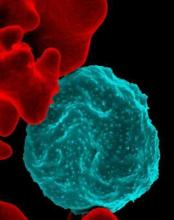A new malaria vaccine successfully protected a group of healthy United States adults from malaria for more than a year, according to Dr. Andrew Ishizuka and his associates.
In a phase I trial, 57 malaria-naive people received the PfSPZ Vaccine, which contains live but weakened Plasmodium falciparum sporozoites. Participants received either three or four intravenous doses, or four intramuscular injections with a dosage strength 10 times that of the IV immunizations, and were exposed to malaria 3 weeks after completing immunization. Participants who received the four-dose IV immunization had the highest rate of protection at 78%.
To assess long-term effectiveness of the vaccine, a group of five participants who had previously been exposed to malaria at 3 and 21 weeks post-immunization were exposed again after 59 weeks. No P. falciparum was found in the blood of these participants, while a group of six unvaccinated controls who were exposed to the parasites developed malaria.
“Malaria remains one of the most devastating diseases in the world, especially among young children in Africa. A malaria vaccine that provides long-term protection is urgently needed to reduce mortality and eliminate transmission. This study is an encouraging step forward in our goal to control and ultimately eradicate malaria,” Dr. Anthony S. Fauci, director of the National Institute of Allergy and Infectious Diseases, said in a press release.
Find the study in Nature Medicine (2016 May. doi: 10.1038/nm.4110).


